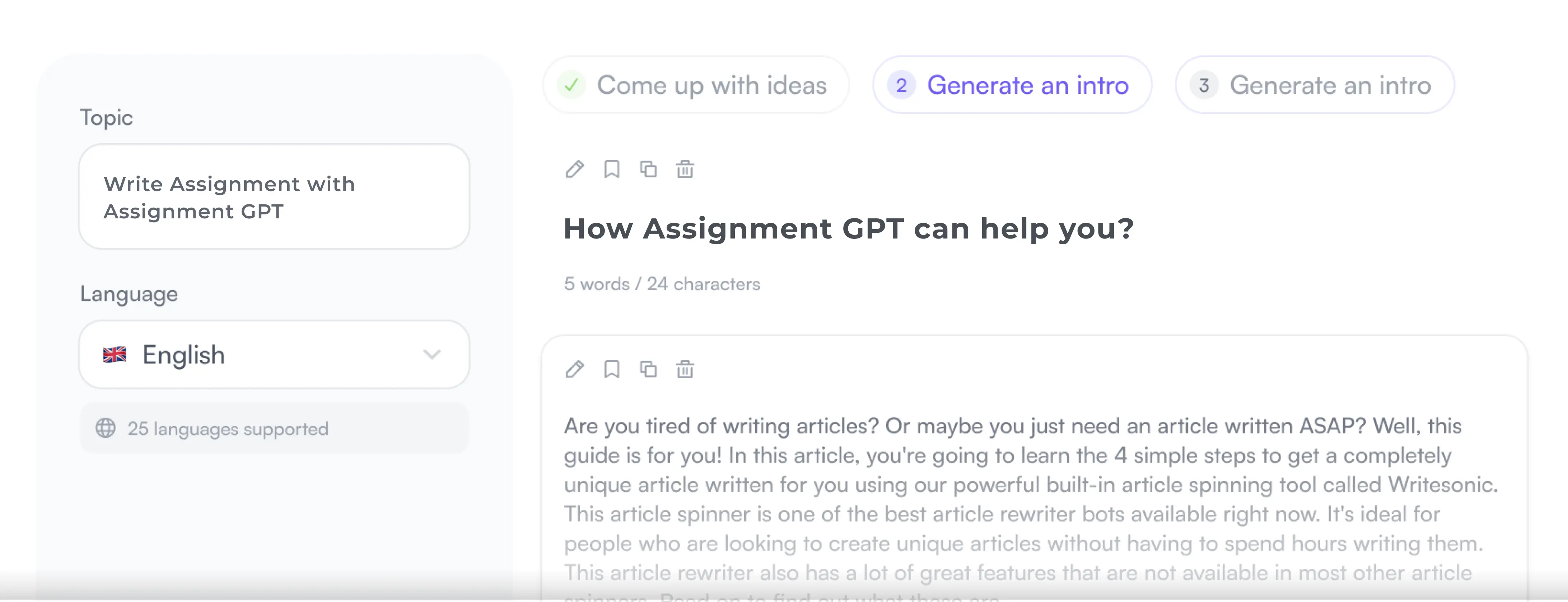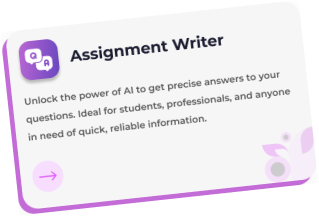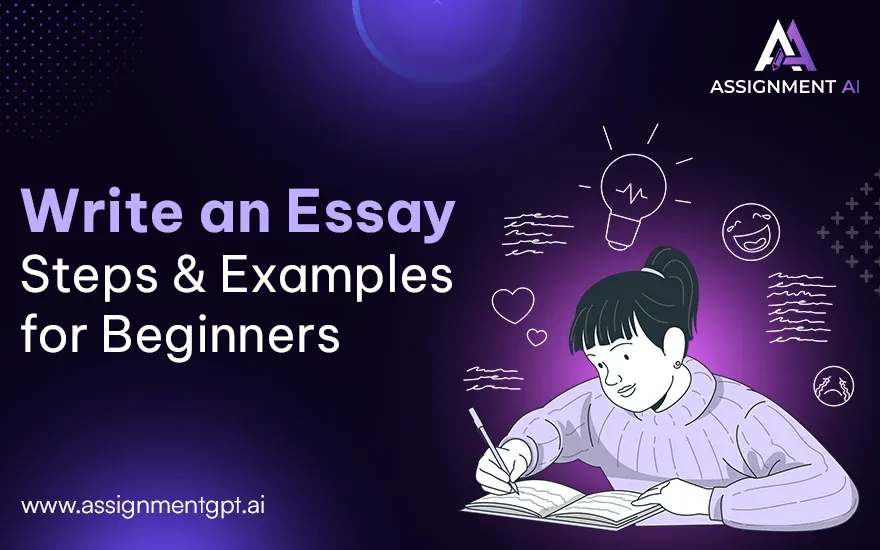AssignmentGPT Blogs
At first, you might suppose writing an essay is hard. Don't worry, it is now not! This guide helps you navigate the crucial steplaystation . From on the brink of checking your work, we've got case research and recommendation for each element. So, essay writing? You've got this!
Quick Summary
Don't worry writing an essay! Just observe the right steps. Start with preparation: Understand what you're being asked, choose your problem, dig into it, create your most important argument, and plan out the essay's primary points. When you begin writing, hook the reader with a captivating starting. Keep their interest. Put the placing in vicinity, declare your thesis, and give a roadmap of your argument. The middle part of the essay need to move deeper into your points: logically arranged paragraphs, evidence-backed claims, and clear reasons. Finish sturdy. Repeat your most important thoughts, restate your thesis, and deliver the reader something to contemplate. Don't convey up something new or overused within the conclusion. Observe proper referencing and ask others to critique your paintings. Over time, your essay writing will constantly improve.
Essay writing process
The essay writing process involves several key steps: planning, researching, drafting, revising, and editing. Initially, one should plan the essay by understanding the prompt and organizing thoughts through an outline. Researching provides evidence and deepens understanding, while drafting turns outlines into paragraphs. Revising involves evaluating and restructuring the content for clarity and flow.
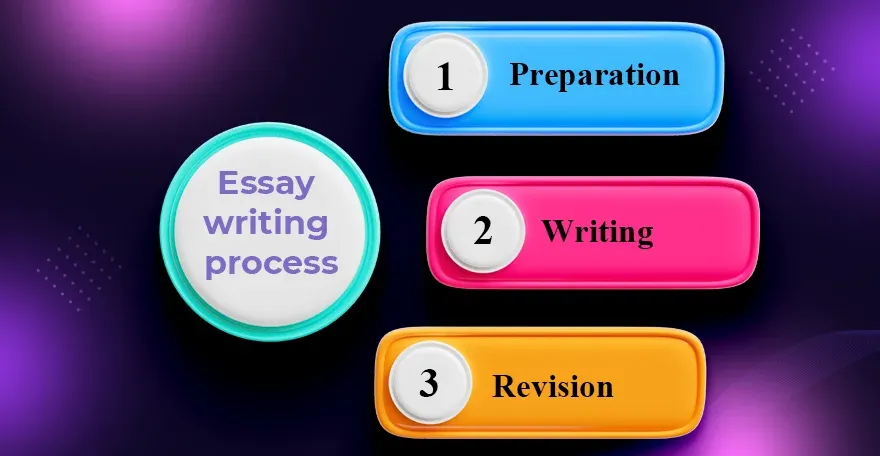
Here is the steps to follow while doing essay writing process:
1. Preparation
- Start with a company hold close of the subject.
- Pick a theme you care about.
- Learn approximately it from trustworthy supplys.
- Plan a robust argument.
- Organize your thoughts well.
Doing these steps will make your essay clear, well-organized, and centered on the right subject.
2. Writing
- Start crafting your essay based at the prep work performed.
- Snag your reader's hobby with a charming opener.
- Move to the meat of your essay and make your paragraphs clear.
- Wrap it up with a sturdy precis of your key ideas.
- Make positive your notions hyperlink up, yet stick to your essay's framework and intentions.
3. Revision
- Once you have completed your preliminary draft, positioned it underneath the microscope with some modifying.
- Examine your paper to make sure it makes experience, carries no ambiguities, and is grounded in reality.
- See if the supporting evidence simply improves your arguments and if the shape of your essay holds together smoothly.
- Scan for any grammar or punctuation errors.
- Make the important adjustments to beautify your essay aheadvert of handing it in.
Read also this article : Unlocking Essay Length
Preparation for writing an essay
Preparing for essay writing involves selecting a topic, researching extensively, and organizing thoughts. Create an outline to structure the essay logically. Consider the audience and purpose, refine your thesis statement, and gather supporting evidence.
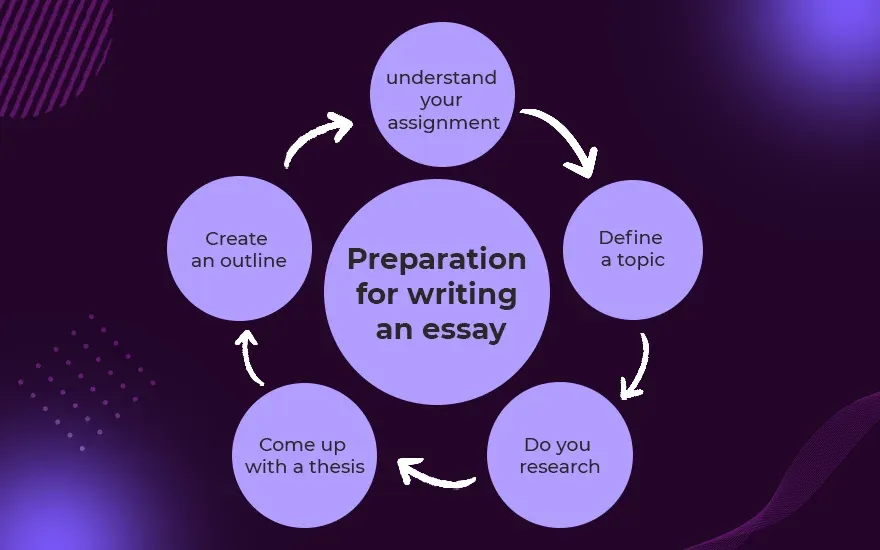
1. Understand your assignment
Get a grip on your task, don't leap into your composition just yet. First, examine the task details meticulously to comprehend its aim, range, and demands. Pinpoint critical pieces like the theme, size, structure, and any particular rules set down by your teacher so you can successfully meet the standards.
2. Define a topic
Pick a subject opt for a special interest or topic that fits the task's needs. Look at the range, significance, and intricacy of the subject to make sure it's good for digging into for the essay and can be capably tackled within the set limits.
3. Do you research
Go through main and subordinate resources, jotting down key points. They will guide your stance and viewpoint on the subject. Analyze dominant and secondary materials again, making useful notes. These will shape your stand and perspective.
4. Come up with a thesis
Your primary point or claim is what we call a thesis. A thesis helps to stay focused on the essay. You should constantly revisit it while writing.
5. Create an outline
Plan out a basic framework for your essay with an outline. This simplifies the beginning stage of writing and ensures you stay on course as you proceed.
Writing the Introduction
Writing an essay opening serves as the stage setter, it gives readers a glimpse of what's coming next. While not long, it makes up around 10 to 20% of the entire text.
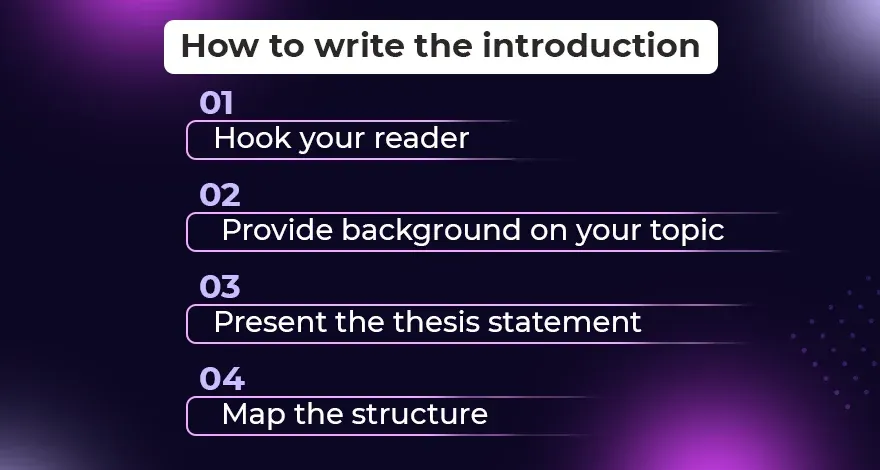
1. Hook your reader
The opening line of the intro should make your reader curious and excited. Sometimes, this is called the hook. It could be an interesting question, an unexpected truth, or a strong point highlighting why the topic matters.
2. Provide background on your topic
Laying down some groundwork is key. This could mean sharing some basic info, offering a quick summary of key scholarly discussions, or defining complex words. Avoid an overload of information in the introduction. Save the finer details for the essay's main body.
3. Present the thesis statement
Consider your thesis or statement. This is the core claim you will argue. The thesis offers direction and shows your stance on the matter. It typically spans one or two sentences.
4. Map the structure
For longer pieces, the introduction can conclude with a quick rundown of each essay section. This guides the reader, offering a glimpse into how your argument unfolds.
Ready to master essay writing?
Unlock Assignment AI easy-to-follow guide with practical steps and examples. Start your journey to becoming an expert essay writer today.
Writing the main body
Your essay's prime portion is where you back up your thesis, offer proof, and unfold your thoughts. It's meant to showcase, understand, and scrutinize the information and resources you've assembled to endorse your argument.
1. Length of the body text
Your essay's body length varies. Typically, it's 60-80% of the whole essay. For high school essays, you might have only three paragraphs. However, a graduate school essay of 6,000 words can cover 8-10 pages.
2. Paragraph structure
An essay needs a clear path, so you should organize it into sections. Each section should focus on a single point or thought. Start it off with a sentence that introduces this topic. This sentence should ideally be a continuation of the last section's idea and set the scene for the new point.
Using connecting words can create a smooth reading flow between sentences. After introducing the topic, bring in some solid backup like data, real-life examples, or expert quotes. Don't forget to clarify this evidence and explain its importance. This will aid in strengthening your overall stance.
Writing the conclusion
Writing an essay ending is its last paragraph. Most often, it only occupies about 10-15% of the entire text.
Revisit your statement.
Clarify the significance of your viewpoint.
Ideally, a good conclusion ends with a noteworthy statement that leaves a powerful last thought for the reader.
What not to include in a conclusion
Conclusion of writing an essay strongly requires sidestepping certain pitfalls.
- Introducing new points or proofs.
- Sabotaging your claims.
- Using cliche final words such as "To wrap up..." or "In conclusion..."
FAQs
1. What is the format for writing an essay?
2. Describe a thesis statement?
3. What is referred to as a topic sentence?
4. Is it necessary to cite my sources?
Content writer at @AssignmentGPT
Rashi vashisth is a content writer who helps brands put their thoughts into words. She creates blogs, website content, and brand stories that are easy to understand and feel genuine. Her writing style focuses on keeping things clear and making sure the message connects with the right people.
Master AI with
AssignmentGPT!
Get exclusive access to insider AI stories, tips and tricks. Sign up to the newsletter and be in the know!

Transform Your Studies with the Power of AssignmentGPT
Empower your academic pursuits with tools to enhance your learning speed and optimize your productivity, enabling you to excel in your studies with greater ease.
Start Your Free Trial ➤Start your success story with Assignment GPT! 🌟 Let's soar! 🚀
Step into the future of writing with our AI-powered platform. Start your free trial today and revolutionize your productivity, saving over 20 hours weekly.
Try For FREE ➤